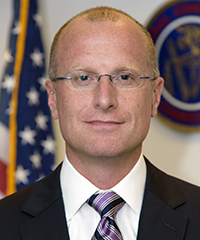New FCC Chairman Carr Seen Clarifying Space Rules and Streamlining Approvals Process
Incoming Federal Communications Commission (FCC) Chairman Brendan Carr will place a major focus on deregulation of commercial space activities and streamlining the approvals processes, space policy according to Communications Daily. Carr has said faster licensing and permitting of commercial space operations will be a priority.
FCC Commissioner Brendan Carr is the senior Republican on the FCC, having served previously as the FCC’s General Counsel. Nominated by both President Trump and President Biden, Carr has been confirmed unanimously by the Senate three times. Described by Axios as “the FCC’s 5G crusader,” Carr has led the FCC’s work to modernize its infrastructure rules and accelerate the buildout of high-speed networks. His reforms cut billions of dollars in red tape, enabled the private sector to construct high-speed networks in communities across the country, and extended America’s global leadership in 5G.

FCC Commissioner Brendan Carr has been nominated by Donald Trump to be the next FCC Chairman. Photo Credit: FCC
In addition, some expect long-awaited clarity on what agency oversees novel space missions like in-orbit servicing, assembly and manufacturing, or asteroid mining. Moreover, the experts anticipate increased openness about the use of satellite communications in federal programs fighting the digital divide.
Satellite Industry Association (SIA) President Tom Stroup said a policy shift that would include satellites becoming a qualified provider of broadband for federally funded programs is likely. The Biden administration effectively excluded satellite use, and there needs to be “an honest discussion” about the sector’s potential role, space lawyer Jim Dunstan said.
Space policy is often relatively consistent from administration to administration, though with some tweaks, said Michelle Hanlon, executive director of the Center for Air and Space Law at the University of Mississippi School of Law. She said that aside from a reduction of regulatory red tape, there also could be a reconciling of agencies’ orbital debris policies. Commercial space operators generally would like to see Commerce’s Office of Space Commerce as the regulator of novel space activities, as long as it is adequately staffed. But regardless of who has the oversight, the biggest need is a final decision on authority, she said. The Republican trifecta of the White House, the House and Senate could bring a resolution, Hanlon said.
The FCC under Carr might not be as aggressive as it has been on orbital debris regulation, but it won’t neglect it altogether, emailed Michael Dodge, University of North Dakota space studies associate professor. He said the space industry likely sees Carr as friendly toward its goals.
Summit Ridge Group’s Armand Musey stated that it’s hard to overstate SpaceX’s impact on the commercial space sector, and its progress will likely dominate most investment decisions. He said Carr’s seeming openness toward allowing satellite participation in broadband access programs like BEAD and the rural digital opportunity fund will benefit Starlink, but also Viasat and the industry broadly. At SpaceX’s urging, Carr is also likely more open than Democrats to increases in power levels for non-geostationary orbit satellite systems, Musey predicted. That could benefit direct-to-device operators, including Starlink, but also AST SpaceMobile, Globalstar and Lynk, he said. M&As under Carr and a Republican DOJ could be somewhat looser for space-related deals, and larger transactions might face fewer conditions, he added.
SpaceX CEO Elon Musk’s friendly relationship with President-elect Donald Trump and Carr could benefit commercial space operators broadly, but it’s also raising eyebrows, sources agree. Musk’s role as co-head of Trump’s Department of Government Efficiency advisory committee will provide him with considerable influence, “and people will wonder where the lines might blur between a business seeking governmental approvals, and an advisor seeking benefits for his business,” Dodge said.
References:
https://www.fcc.gov/about/leadership/brendan-carr
https://www.cnn.com/2024/11/18/media/brendan-carr-trump-fcc-nominee-project-2025/index.html
FCC: More competition for Starlink; freeing up spectrum for satellite broadband service
FCC approves EchoStar/Dish request to extend timeline for its 5G buildout
FCC restores net neutrality order, but court challenges loom large
Analysis: FCC attempt to restore Net Neutrality & U.S. standards for broadband reliability, security, and consumer protection
FCC Draft Net Neutrality Order reclassifies broadband access; leaves 5G network slicing unresolved
FCC increases broadband speed benchmark (x-satellites) to 100/20 Mbit/s
FCC legal advisor: Potential End of ACP Is the ‘Biggest Challenge’ Facing the Broadband Marketplace
Highlights of FCC Notice of Inquiry (NOI) on radio spectrum usage & how AI might be used



Local Officials in West Va. Want Fiber, not Satellite, from BEAD
In an April 18 letter to West Virginia Governor Patrick Morrisey, R, all three members of the Grant County Commission said fiber better aligned with the county’s unique geography, socioeconomic needs, and long-term development goals.
“It is evident that fiber-to-the-home provides a more sustainable, equitable and high-performance option for our community,” Commission President Kevin Hagerty said, along with Commissioners Scotty Miley and Tyson Riggleman.
The commission cited the superior reliability and performance of fiber-to-the-home technology and noted that these qualities made fiber a better long-term investment for the county. They also pointed to the state’s goals of promoting local economic development and attracting data centers, which require fiber connections, as reasoning behind building out fiber over satellite services.
Equitable access and network resilience were further concerns of the commission. Higher costs, data caps, poor support and variable speeds could hamper the ability of low-income or underserved residents to connect to the internet, while the complex geography of the county could create logistical difficulties for consistent satellite deployment.
“Fiber is a more affordable solution for the Grant County residents, and with better technical support from our local Internet service providers. From our experience, you cannot talk to technical support when asking for help from Starlink,” the commission said.
The commission also noted Grant County’s proximity to the National Radio Quiet Zone, raising concerns that increased satellite-based connectivity solutions could disrupt the zone’s operations.
Starlink received permission to begin operating in portions of the 13,000 square mile NRQZ on October 25, 2024, following a three-year effort to bring residential satellite connectivity to the area’s 8,000 residents.
https://broadbandbreakfast.com/local-officials-in-west-va-want-fiber-not-satellite-from-bead/